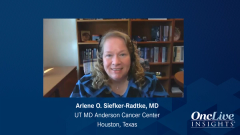
Multidisciplinary Care in Metastatic Urothelial Cancer
An overview of the types of health care professionals who may help manage patients with metastatic urothelial cancer throughout their disease course.
Episodes in this series

Arlene O. Siefker-Radtke, MD: What I'm hearing from you, Scott, is this is a standard of care. It's something that we should be doing in all patients with bladder cancer, especially those stage IV patients. Despite that, we still haven't seen uptake in 100% of the community. It's been a challenging time to get the message out. A lot of these approvals that happen during the pandemic are happening during a time when our community oncologists are busier than ever; they’re busy following the social distancing algorithms, facing the challenges of health care worker shortages, and then an additional challenge. The additional challenge is even though we love to get tissue from a metastatic site, we can't always get tissue, even at an academic center, and access to great interventional radiologists is a potential limitation. Getting that message out to our community specialists, those who are working in the field, is important because there is an important therapy that can help patients with urothelial cancer. How do you incorporate other members of your multidisciplinary team when you're talking with the patient about mutation testing, or ordering, or following up on specimens? Is the multidisciplinary experience important to what you're doing?
Scott T. Tagawa, MD, MS, FACP: Yes, that multidisciplinary care is important throughout patients’ course with urothelial carcinoma across stages. Certainly, within our medical oncology clinic, we have the MD or DO [doctor of medicine, doctor of osteopathic medicine] that is the main physician there, and we work with a lot of physician extenders. We happen to, at the current time, only have NPs, [nurse practitioners] but we've traditionally had a mix of NPs and PAs [physician assistant] that are seeing patients with us and helping assess patients. Certainly, once it comes to ordering, and that could be diagnostic ordering, or therapeutic ordering… a much bigger percentage of them that will help, and our clinic assistants will help with the scheduling some of the time. Our NPs are sophisticated when it comes to testing. Sometimes, I'll just say, "Let's schedule a biopsy," and that's pretty much all I need to say. They will know if someone needs labs that need scheduled, they'll get that done. If someone has multiple sites, sometimes they will ask me what site to put in the order to our interventional radiologist. Sometimes I will purposely pick a site, particularly a nonbony site, because bone can be more difficult to work with in terms of decalcification. But sometimes, I want a liver biopsy, for instance, as opposed to a nodal biopsy, if feasible. Other times, I'll say, "I want to get a good chunk of tissue. Tell the interventional radiologist that, whatever site is most successful in a safe manner;" they will be involved in that. And then certainly, they will, as well as our clinical pharmacist, be involved with the initiation of treatment once we have the discussion with the patient and his/her family. We'll talk about the rationale for whatever regimen we're going to use, and the adverse effect profiles, as a team. Sometimes, it's repetition. I will say something and following me is the NP that's going to say the same thing and/or answer additional questions, provide literature when we have it available, and then work with our pharmacist to initiate that therapy, whether it's intravenous or whether it's working with a specialty pharmacy to get an oral drug. Many people are involved, and that's prior to the therapy. Then certainly, once someone is on therapy, the assessments are also multidisciplinary with the radiation oncologist, as well as our NPs, and when it's intravenous, our infusion nurses as well.
Transcript edited for clarity.





































